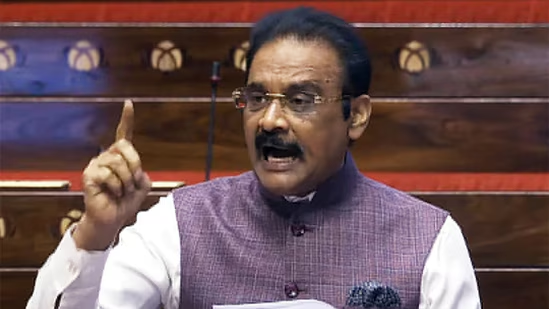
Trade
As trade tensions escalate between India and the United States, a bold and unexpected response has emerged from Indian political circles. Rajya Sabha MP and senior Aam Aadmi Party (AAP) leader, Sanjay Singh, penned a scathing open letter addressed to former U.S. President Donald Trump, following Trump’s recent proposal to impose a 50% tariff on all Indian imports if he returns to power in the 2024 U.S. presidential elections.
In his letter, Singh posed a powerful rhetorical question: “What if Indians boycott American firms?”—a sharp warning layered with economic implications, national pride, and a broader call for global trade equity. The letter, which quickly gained traction on social media, represents not just a political outcry but a rallying cry for economic nationalism in a world increasingly shaped by protectionist tendencies.
The Spark: Trump’s 50% Tariff Threat
Donald Trump, known for his ‘America First’ doctrine and aggressive trade policies during his previous tenure, recently reignited tensions by threatening a sweeping 50% tariff on Indian goods, including textiles, pharmaceuticals, auto parts, and electronics. Trump justified the move by claiming that the U.S. trade deficit with India is “unacceptable” and must be balanced, even if it means resorting to drastic measures.
While the Indian government has not yet issued an official statement, opposition parties, economists, and industry leaders have expressed concern over the implications such a tariff could have on India’s export-dependent sectors and the broader Indo-U.S. trade relationship.
The Letter: A Nationalist Response
Sanjay Singh’s open letter stands out not only for its fiery tone but also for its populist appeal. In the letter, Singh writes:
“If you think levying a 50% tariff on Indian products will intimidate us, let me remind you that Indian consumers are also powerful. What if we start boycotting American firms like Apple, Google, Amazon, Coca-Cola, Pepsi, and McDonald’s?”
He goes on to argue that such protectionist rhetoric undermines the spirit of international cooperation and mutual respect. The letter underscores how Indians have increasingly embraced the ‘Vocal for Local’ philosophy, particularly after the COVID-19 pandemic and the 2020 border standoff with China, where many Chinese apps and products faced widespread bans and boycotts in India.
Economic and Political Ripples
Singh’s warning resonates beyond political posturing. India is one of the fastest-growing consumer markets in the world, and many American giants—from Amazon to Apple—have made significant investments in the country. A consumer-led boycott, even partial, could cause noticeable dents in revenue streams and strategic plans.
Furthermore, Trump’s statement and Singh’s response come at a time when the global geopolitical landscape is realigning. India has emerged as a key player in the Global South and an indispensable partner in tech, pharmaceuticals, and defense for both the West and the East.
Economists warn that escalating trade barriers between major economies like the U.S. and India could disrupt supply chains, affect job creation, and fuel inflation on both sides. “In today’s interconnected global economy, punitive tariffs are a double-edged sword,” said a senior trade analyst. “India may suffer in the short term, but U.S. companies will also lose access to one of the most promising markets.”
Public Reaction: National Sentiment on the Rise
Indian social media exploded with reactions to Singh’s letter. Hashtags like #BoycottAmericanProducts and #TrumpTariffThreat began trending, with citizens expressing a mix of outrage and pride. Many applauded Singh for standing up to what they perceived as bullying tactics, while others questioned the economic feasibility of a full-scale boycott.
However, it is undeniable that the idea of consumer activism in India has matured. From rejecting Chinese phones to preferring Indian-made brands, the younger demographic is increasingly aware of how their choices impact national interests.
Diplomatic Balance Ahead
While Singh’s letter captures the emotional pulse of the public, the road ahead for the Indian government will require a delicate diplomatic approach. With the U.S. being a strategic ally in defense, trade, and counter-terrorism, any escalation must be tempered with long-term national interests.
Still, Singh’s message has thrown down a gauntlet—asserting that India is not merely a passive player in global trade games. If Trump returns to the White House and follows through on his threats, the world could witness a new phase of trade warfare—this time, with India as an assertive and unyielding participant.
Conclusion: More Than a Letter, A Line in the Sand
Sanjay Singh’s letter may not carry the weight of official diplomacy, but it reflects a growing assertion of Indian self-respect in the global arena. It also taps into a rising nationalistic sentiment that believes India, as a growing global power, cannot and should not be taken for granted.
As Trump eyes another run at the presidency and India prepares for its own elections, one thing is clear: the era of quiet compliance is over.
Thanks For Reading